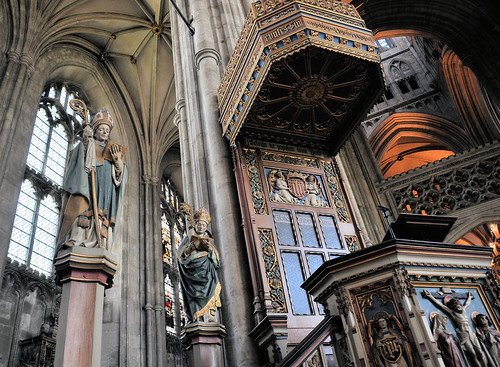Academic attainment
Richard Clarke (also Clerke), was born in London, date unknown (1562?), to George Clarke (d. 1607). He entered Christ's College, Cambridge in 1579 and graduated BA, 1583, becoming a fellow of the College that same year. Three years later he was granted an MA. Clarke also proceeded BTh in 1593, and was awarded a D Th 1598. Conflict within the College caused him to relinquish his fellowship.
Christ Church College, CambridgeFlickr.com
Doctrinal conflict
Clarke was a leader of a minority faction in a generally puritan atmosphere, which preferred to conform to the prevailing rites and ceremonies of the Elisabethan settlement. In 1590 he came into conflict with the strongly Calvinist George Downame, a fellow at Christ‘s, and doctor of Divinity. This conflict stemmed from failure to gain desired promotion within the College - Clarke felt discriminated against because his puritan views were not more radical.
Family life
Having resigned his fellowship at Christ’s College, Clarke became a vicar on the island of Thanet. Marriage followed, and a son, Martin, born around 1602. The same year he was given the office of six-preacher in Canterbury Cathedral; and records of baptisms and funerals show he was often resident in the city.
flickr.com
During their marriage Clarke's wife had given birth to at least ten children/ She died and was buried in Canterbury Cathedral,1620; most of the children also predeceased their father. Having so many children may have cost him the Mastership of his College, as King James 1 passed over him, whereas his initial recommendation for the post made an appointment look promising.
Translating the KJV
Richard Clarke was highly respected for his knowledge of Hebrew, and he served in the First Westminster Company which was responsible for translating the first twelve books of the Old Testament - Genesis to 2 Kings.
Publications
A large folio volume of seventy-four sermons (“Sermons Preached by that Reverend and Learned Divine Richard Clerke (1637)”, was published posthumously by Charles White M.A. in London. McClure comments:
. . . [A]las for "folios" and learned sermons" in these days. When people look on such a thing, they are ready to exclaim, like Robert Hall, at the sight of Dr. Gill's voluminous Commentary,--"What a continent of mud!"According to William Prynne's account (1646), Clarke's sermons showed his anti-Catholic views, as a moderate Calvinist who opposed papal authority, attacked the mass, criticized monks and clergy, and restricted salvation to a definitive elect.
. . . [T]heir message was generally non-controversial, valuing equally prayer, preaching, sacraments, and the decency of actions such as kneeling at communion. Such a message sits reasonably comfortably with the antipuritanism of his younger days. (3)
Clarke became rector of Shargate. and vicar of Monkton with Birchington, where he ministered from 1609 until his death in 1634. He left two sons and a daughter, having married a second time.
(1) Payne, Gustavus, (1959/1977)The men behind the King James version, MI: Bakerpp. 62 - 63
(2) Nicolson, Adam. (2003) Power and glory: Jacobean England and the making of the King James Bible, Lon: Harper. pp. 125-128
(3) Larminie, Vivienne. (2004) Oxford Dictionary of National Biography.

